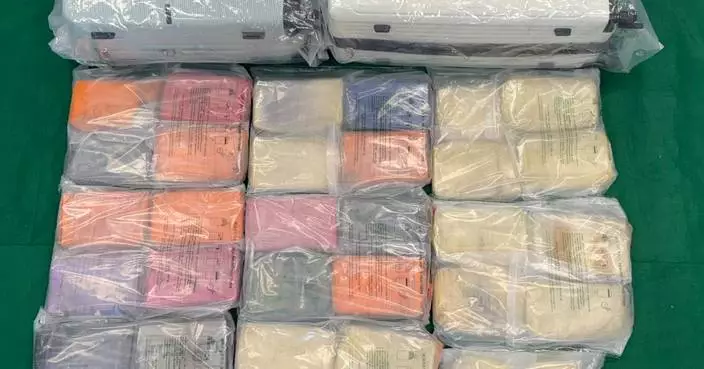Hong Kong Customs detects money laundering case involving about $1.6 billion
Hong Kong Customs mounted an operation codenamed "Spark II" yesterday and today (October 15 and 16). Five local men, aged between 34 and 71, were arrested for conspiracy or aiding to "deal with property known or reasonably believed to represent proceeds of an indictable offence" (commonly known as money laundering) under the Organized and Serious Crimes Ordinance (OSCO). They included a former compliance officer and a company secretary of a money changer, a bank staff member and former company directors. The total amount involved was about $1.6 billion.
In October last year, Customs mounted an operation codenamed "Spark" and cracked down on a money changer suspected of money laundering in which the compliance officer laundered about $600 million from unknown sources by setting up a shell company. After an in-depth follow-up investigation, it was further found that the compliance officer manipulated two other shell companies and opened a total of 23 accounts at a number of local banks to deal with over 4 000 suspicious transactions since 2020. Meanwhile, the investigation also found that a bank staff member was suspected of assisting the relevant arrested persons to evade the bank’s monitoring of customers’ transactions.
During the operation, a number of mobile phones were seized and the five persons who were suspected of assisting in dealing with the suspected crime proceeds in the accounts were arrested.
The investigation is ongoing. All arrested persons have been released on bail pending further investigation, and the likelihood of further arrests is not ruled out.
Customs reminds members of the public that they risk committing the crime of money laundering if they use bank accounts to assist in dealing with money from unknown sources, regardless of whether a monetary reward is involved.
Under the OSCO, a person commits an offence if he or she deals with any property knowing or having reasonable grounds to believe that such property, in whole or in part, directly or indirectly represents any person's proceeds of an indictable offence. The maximum penalty upon conviction is a fine of $5 million and imprisonment for 14 years while the crime proceeds are also subject to confiscation.
Members of the public may report any suspected money laundering activities to Customs' 24-hour hotline 182 8080 or its dedicated crime-reporting email account (crimereport@customs.gov.hk) or online form (eform.cefs.gov.hk/form/ced002/).
Special traffic arrangements for triathlon on Hong Kong Island
Police will implement special traffic arrangements in Central and Wan Chai from this Friday to Sunday (April 4 to 6) to facilitate the holding of a triathlon event.
A. Road closure
The following roads will be closed:
(1) From 10am on April 4 to 6pm on April 6:
Expo Drive between Legislative Council Road and Expo Drive Central.
(2) From 1am to 2pm on April 5 and from 1am to 6pm on April 6:
- Yiu Sing Street;
- Eastbound Lung Wo Road between Man Yiu Street and Fleming Road, including the slip road of eastbound Central – Wan Chai Bypass tunnel from Wan Chai to North Point;
- Westbound Lung Wo Road between southbound Lung Tat Path and southbound Tim Wa Avenue;
- Northbound Lung Tat Path;
- Lung Hop Street;
- Legislative Council Road between Legislative Council Complex Car Park exit and Lung Wo Road;
- Part of the traffic lanes of the slip road of westbound Central - Wan Chai Bypass Tunnel heading to Central District;
- Part of the traffic lanes of eastbound Man Po Street near Man Yiu Street;
- Part of the traffic lanes of eastbound Man Po Street near Finance Street;
- Part of the traffic lanes of southbound Man Yiu Street between Man Kwong Street and westbound Yiu Sing Street;
- Part of the traffic lane of southbound Man Yiu Street near Lung Wo Road;
- Part of the traffic lanes of westbound Lung Wo Road between Tim Wa Avenue and Man Yiu Street;
- Part of the traffic lanes of northbound Fleming Road between westbound Convention Avenue and eastbound Lung Wo Road;
- Part of the traffic lanes of westbound Hung Hing Road near Fleming Road;
- The slip road of westbound Central - Wan Chai Bypass Tunnel leading to the exit of Lung Wo Road; and
- Part of the traffic lanes of westbound Convention Avenue near northbound Fleming Road.
B. Traffic diversions
In connection with the road closure as mentioned above, the following traffic diversions will be implemented:
(1) From 10am on April 4 to 0.59am on April 5 and 2.01pm on April 5 to 0.59am on April 6:
Traffic along eastbound Expo Drive heading to Hong Kong Convention and Exhibition Centre will be diverted via eastbound Lung Wo Road and northbound Expo Drive East.
(2) From 1am to 2pm on April 5 and from 1am to 6pm on April 6:
- Traffic along westbound Man Kwong Street heading to eastbound Lung Wo Road via southbound Man Yiu Street will be diverted via southbound Man Yiu Street, eastbound Connaught Place, southbound Connaught Place, eastbound Connaught Road Central, eastbound Harcourt Road, eastbound Gloucester Road and northbound Fleming Road;
- Traffic along eastbound Man Po Street heading to Admiralty or Mid-levels via eastbound Lung Wo Road will be diverted via the slip road of eastbound Man Po Street heading to westbound Finance Street, westbound Finance Street, temporary exit connecting Finance Street and Central - Wan Chai Bypass Tunnel, the slip road of westbound Central - Wan Chai Bypass Tunnel heading to eastbound Man Kat Street, eastbound Man Kat Street, eastbound Connaught Road Central and eastbound Harcourt Road;
- Traffic along eastbound Man Po Street heading to eastbound Lung Wo Road via eastbound Yiu Sing Street will be diverted via southbound Man Yiu Street, eastbound Connaught Place, southbound Connaught Place, eastbound Connaught Road Central, eastbound Harcourt Road, eastbound Gloucester Road and northbound Fleming Road;
- Traffic along eastbound Man Po Street heading to eastbound Lung Wo Road will be diverted via southbound Man Yiu Street, eastbound Connaught Place, southbound Connaught Place, eastbound Connaught Road Central, eastbound Harcourt Road, eastbound Gloucester Road and northbound Fleming Road;
- Traffic along southbound Man Yiu Street cannot turn left to eastbound Lung Wo Road and eastbound Yiu Sing Street. Vehicles will be diverted via southbound Man Yiu Street, eastbound Connaught Place, southbound Connaught Place, eastbound Connaught Road Central, eastbound Harcourt Road, eastbound Gloucester Road and northbound Fleming Road;
- Traffic along eastbound Man Cheung Street heading to eastbound Lung Wo Road will be diverted via southbound Man Yiu Street, eastbound Connaught Place, southbound Connaught Place, eastbound Connaught Road Central, eastbound Harcourt Road, eastbound Gloucester Road and northbound Fleming Road;
- Traffic along westbound Lung Wo Road cannot turn right to northbound Yiu Sing Street. Vehicles will be diverted via westbound Lung Wo Road and northbound Man Yiu Street;
- Traffic along eastbound Yiu Sing Street and southbound Yiu Sing Street heading to eastbound Lung Wo Road will be diverted via southbound Man Yiu Street, eastbound Connaught Place, southbound Connaught Place, eastbound Connaught Road Central, eastbound Harcourt Road, eastbound Gloucester Road and northbound Fleming Road;
- Traffic along northbound Legislative Council Road cannot turn left to westbound Lung Wo Road, vehicles will be diverted via southbound Legislative Council Road, eastbound Lung Wui Road, eastbound Fenwick Pier Street, roundabout, westbound Fenwick Pier Street, flyover, westbound Harcourt Road, westbound Connaught Road Central and northbound Connaught Place;
- Traffic along westbound Lung Wo Road heading to Chief Executive’s Office via southbound Tim Wa Avenue will be diverted via southbound Lung Tat Path, Convention Avenue, westbound Fenwick Pier Street, flyover, westbound Harcourt Road, westbound Connaught Road Central, u-turn, eastbound Connaught Road Central and northbound Tim Wa Avenue;
- Traffic along eastbound Lung Wui Road cannot turn left to northbound Lung Hop Street;
- Traffic along westbound Fenwick Pier Street cannot turn right to northbound Lung Hop Street. Vehicles will be diverted
via Fenwick Pier Street, flyover, westbound Harcourt Road, westbound Connaught Road Central and northbound Connaught Place;
- Traffic along westbound Convention Avenue heading to westbound Lung Wo Road via northbound Lung Tat Path will be diverted via Convention Avenue, Fenwick Pier Street roundabout, westbound Fenwick Pier Street, flyover, westbound Harcourt Road, westbound Connaught Road Central and northbound Connaught Place;
- Traffic along southbound Expo Drive East heading to westbound Lung Wo Road will be diverted via southbound Lung Tat Path, Convention Avenue, Fenwick Pier Street roundabout, westbound Fenwick Pier Street, flyover, westbound Harcourt Road, westbound Connaught Road Central and northbound Connaught Place;
- Traffic along westbound Hung Hing Road heading to westbound Lung Wo Road will be diverted to southbound Lung Tat Path, Convention Avenue, Fenwick Pier Street roundabout, westbound Fenwick Pier Street, flyover, westbound Harcourt Road, westbound Connaught Road Central and northbound Connaught Place; and
- Traffic along westbound Lung Wo Road heading to Central Pier or Finance Street via Yiu Sing Street will be diverted via westbound Lung Wo Road and northbound Man Yiu Street.
C. Suspension of parking spaces and pick-up/drop-off areas
All parking spaces and pick-up/drop-off areas on the following roads will be suspended:
(1) From 10am on April 4 to 6pm on April 6:
All metered parking spaces and pick-up/drop-off areas on Expo Drive.
(2) From 10pm on April 4 to 2pm on April 5 and from 10pm on April 5 to 6pm on April 6:
- All metered parking spaces on Yiu Sing Street and Lung Hop Street;
- Lay-bys on westbound Lung Wo Road near City Hall and near Central Barracks; and
- Lay-by on Edinburgh Place near City Hall.
All vehicles parked illegally during the implementation of the above special traffic arrangements will be towed away without prior warning, and may be subject to multiple ticketing.
The Police will implement the special arrangements depending on the prevailing traffic and crowd conditions. Motorists should exercise patience, and take heed of instructions of the Police on site.















































